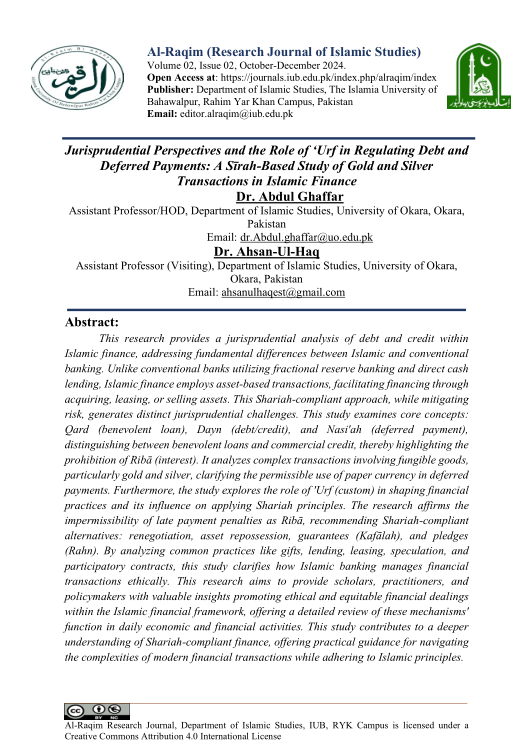Jurisprudential Perspectives and the Role of ‘Urf in Regulating Debt and Deferred Payments: A Sīrah-Based Study of Gold and Silver Transactions in Islamic Finance
Keywords:
Islamic Finance, Ribā, Debt, Deferred Payment, Gold Transactions, 'Urf (Custom).Abstract
This research provides a jurisprudential analysis of debt and credit within Islamic finance, addressing fundamental differences between Islamic and conventional banking. Unlike conventional banks utilizing fractional reserve banking and direct cash lending, Islamic finance employs asset-based transactions, facilitating financing through acquiring, leasing, or selling assets. This Shariah-compliant approach, while mitigating risk, generates distinct jurisprudential challenges. This study examines core concepts: Qard (benevolent loan), Dayn (debt/credit), and Nasi'ah (deferred payment), distinguishing between benevolent loans and commercial credit, thereby highlighting the prohibition of Ribā (interest). It analyzes complex transactions involving fungible goods, particularly gold and silver, clarifying the permissible use of paper currency in deferred payments. Furthermore, the study explores the role of 'Urf (custom) in shaping financial practices and its influence on applying Shariah principles. The research affirms the impermissibility of late payment penalties as Ribā, recommending Shariah-compliant alternatives: renegotiation, asset repossession, guarantees (Kafālah), and pledges (Rahn). By analyzing common practices like gifts, lending, leasing, speculation, and participatory contracts, this study clarifies how Islamic banking manages financial transactions ethically. This research aims to provide scholars, practitioners, and policymakers with valuable insights promoting ethical and equitable financial dealings within the Islamic financial framework, offering a detailed review of these mechanisms' function in daily economic and financial activities. This study contributes to a deeper understanding of Shariah-compliant finance, offering practical guidance for navigating the complexities of modern financial transactions while adhering to Islamic principles.
References

Downloads
Published
Issue
Section
License
Copyright (c) 2024 Dr. Abdul Ghaffar, Dr. Ahsan-Ul-Haq

This work is licensed under a Creative Commons Attribution-NonCommercial 4.0 International License.




